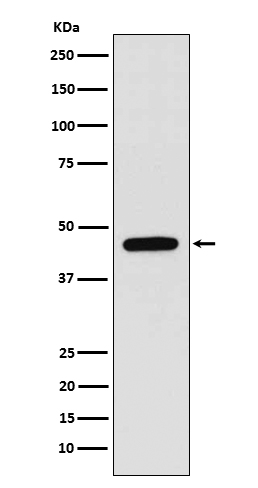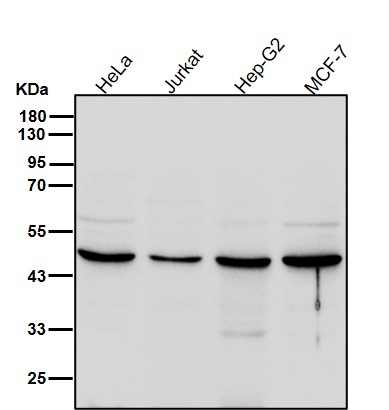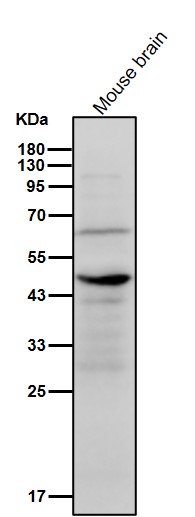


| WB | 咨询技术 | Human,Mouse,Rat |
| IF | 咨询技术 | Human,Mouse,Rat |
| IHC | 1/100-1/200 | Human,Mouse,Rat |
| ICC | 技术咨询 | Human,Mouse,Rat |
| FCM | 咨询技术 | Human,Mouse,Rat |
| Elisa | 咨询技术 | Human,Mouse,Rat |
| Aliases | ATG18; ATG18A; WIPI 1; WIPI-1; WIPI49;;WIPI 1 |
| WB Predicted band size | Calculated MW: 49 kDa ; Observed MW: 48 kDa |
| Host/Isotype | Rabbit IgG |
| Antibody Type | Primary antibody |
| Storage | Store at 4°C short term. Aliquot and store at -20°C long term. Avoid freeze/thaw cycles. |
| Species Reactivity | Human,Mouse,Rat |
| Immunogen | A synthesized peptide derived from human WIPI 1 |
| Formulation | Purified antibody in PBS with 0.05% sodium azide,0.05% BSA and 50% glycerol. |
+ +
以下是关于WIPI1抗体的3篇参考文献,简要整理如下:
1. **文献名称**:*WIPI1 links autophagy to phosphatidylinositol 3-phosphate, Rab5 and membrane traffic*
**作者**:Proikas-Cezanne T, et al.
**摘要**:该研究首次开发并验证了针对人源WIPI1的特异性抗体,证实其通过识别PI3P参与自噬体形成过程,并揭示其与Rab5蛋白在膜运输中的相互作用。
2. **文献名称**:*Autophagy-related protein WIPI1 is a novel regulator of mitochondrial morphology and phagocytosis in macrophages*
**作者**:Vijayan V, et al.
**摘要**:研究利用WIPI1抗体通过免疫荧光和Western blot分析,发现巨噬细胞中WIPI1缺失导致线粒体碎片化,并影响吞噬功能,提示其在免疫代谢中的作用。
3. **文献名称**:*WIPI1 antagonizes breast cancer progression through promoting autophagy-dependent degradation of mutant p53*
**作者**:Chen Y, et al.
**摘要**:通过免疫组化(使用WIPI1抗体)和功能实验,证明WIPI1通过自噬途径降解突变型p53蛋白,抑制乳腺癌发展,为靶向治疗提供潜在策略。
以上文献均涉及WIPI1抗体的实验应用,涵盖基础机制与疾病关联研究。具体文献年份及期刊可通过PubMed/Google Scholar进一步检索确认。
The WIPI1 (WD repeat domain, phosphoinositide interacting 1) antibody is a tool used to study the WIPI1 protein, a member of the WD40 repeat protein family involved in autophagy, a critical cellular degradation process. WIPI1 functions as a phosphatidylinositol 3-phosphate (PI3P)-binding protein that localizes to autophagosomal membranes, playing a key role in autophagosome formation by recruiting other autophagy-related proteins like ATG5-ATG12 and LC3. It acts as a scaffold, linking phosphoinositide signaling to autophagic machinery, particularly during the early stages of autophagosome biogenesis.
Antibodies targeting WIPI1 are widely used in research to detect its expression, localization, and dynamics via techniques such as Western blotting, immunofluorescence, and immunohistochemistry. These studies help elucidate WIPI1's role in cellular homeostasis, stress responses, and diseases like cancer, neurodegenerative disorders, and lysosomal storage diseases, where autophagy dysregulation is implicated. WIPI1 expression is also regulated by nutrient availability and mTOR signaling, making its antibody valuable for investigating metabolic pathways.
Mutations or altered WIPI1 levels correlate with pathological conditions, underscoring its potential as a therapeutic target or biomarker. Researchers rely on WIPI1 antibodies to explore its interactions, post-translational modifications, and contributions to disease mechanisms, advancing understanding of autophagy-related pathologies and treatments.
×